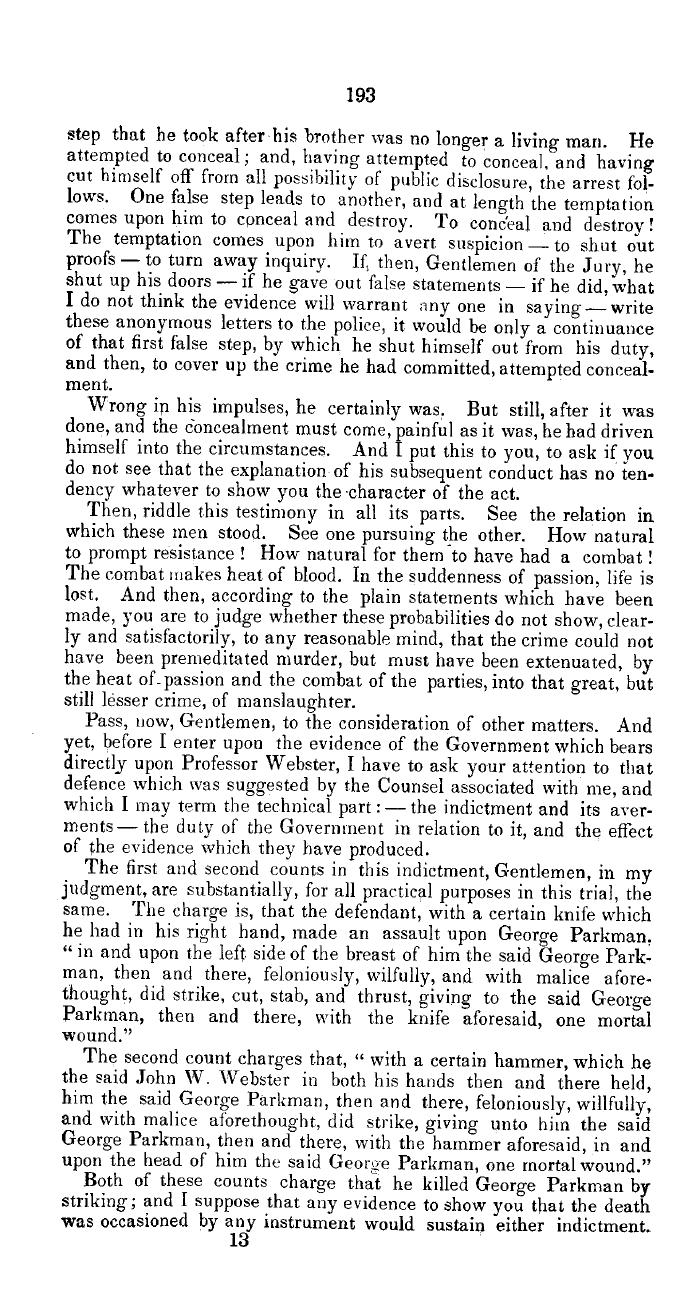|
193
step that he took after his brother was no longer a living man. He
attempted to conceal; and, having attempted to conceal, and having
cut himself off from all possibility- of public disclosure, the arrest fol-
lows. One false step leads to another, and at length the temptation
comes upon him to conceal and destroy. To conceal and destroy !
The temptation comes upon him to avert suspicion - to shut out
proofs - to turn away inquiry. If, then, Gentlemen of the Jury, he
shut up his doors - if he gave out false statements - if he did, what
I do not think the evidence will warrant ;any one in saying-write
these anonymous letters to the police, it would be only a continuance
of that first false step, by which he shut himself out from his duty,
and then, to cover up the crime he had committed, attempted conceal-
ment.
Wrong in his impulses, he certainly was. But still, after it was
done, and the concealment must come, painful as it was, he had driven
himself into the circumstances. And I put this to you, to ask if you
do not see that the explanation of his subsequent conduct has no ten-
dency whatever to show you the character of the act.
Then, riddle this testimony in all its parts. See the relation in
which these men stood. See one pursuing the other. How natural
to prompt resistance ! How natural for them to have had a combat !
The combat makes heat of blood. In the suddenness of passion, life is
lost. And then, according to the plain statements which have been
made, you are to judge whether these probabilities do not show, clear-
ly and satisfactorily, to any reasonable mind, that the crime could not
have been premeditated murder, but must have been extenuated, by
the heat of-passion and the combat of the parties, into that great, but
still lesser crime, of manslaughter.
Pass, now, Gentlemen, to the consideration of other matters. And
yet, before I enter upon the evidence of the Government which bears
directly upon Professor Webster, I have to ask your attention to that
defence which was suggested by the Counsel associated with me, and
which I may term the technical part:-the indictment and its aver-
meDts-the duty of the GoverMnent in relation to it, and the effect
of the evidence which they have produced.
The first and second counts in this indictment, Gentlemen, in my
judgment, are substantially, for all practical purposes in this trial, the
same. The charge is, that the defendant, with a certain knife which
he had in his right hand, made an assault upon George Parkman.
'~ in and upon the left side of the breast of him the said George Park-
man, then and there, feloniously, wilfully, and with malice afore-
thought, did strike, cut, stab, and thrust, giving to the said George
Parkman, then and there, with the knife aforesaid, one mortal
wound."
The second count charges that, '1 with a certain hammer, which he
the said John W. Webster in both his hands then and there held,
him the said George Parkman, then and there, feloniously, willfully,
and with malice aforethought, did strike, giving unto him the said
George Parkman, then and there, with the hammer aforesaid, in and
upon the head of him the said Georoe Parkman, one mortal wound."
Both of these counts charge that he killed George Parkman by
striking; and I suppose that any evidence to show you that the death
was occasioned by any instrument would sustain either indictment.
13
|

